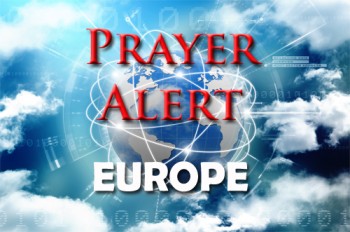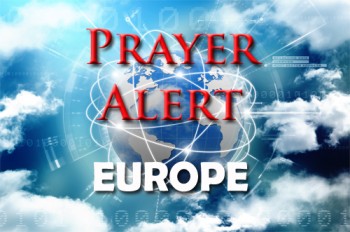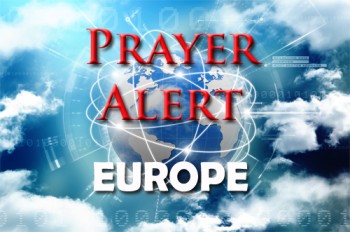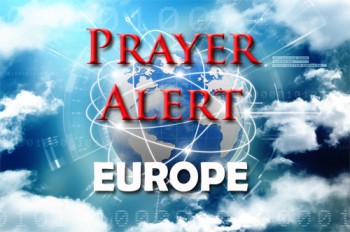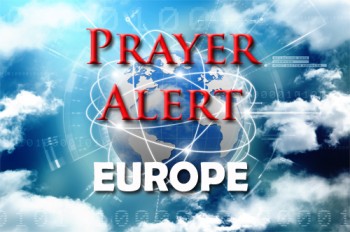Displaying items by tag: Europe
Bosnia: end of fasting
The season of Ramadan, when Muslims set aside time to fast and seek God, has now ended. We can ask Father God not to let that time of intentional seeking go to waste. Pray for the Muslims who may have encountered Jesus in this season. Ask God to connect them with Christians, whether local or expatriate, that they may hear the good news of the gospel from them. Ask God to release the Holy Spirit to move powerfully amongst the ‘not yet’ believers as they return to their daily routines.
Netherlands: Calvinists refuse vaccines and social distancing
In the Netherlands, Protestants make up around 16 percent of the population. A small group of traditional Calvinists are opposed to vaccination and social distancing. Most of these believers, who live in a region known as the ‘Bible Belt’, were never vaccinated as children and are opposed to the idea of injecting sickness into a healthy body. Despite surging case numbers, they continue to attend Sunday services without face masks. But amid some of the country's highest Covid-19 infection rates, some of them are starting to shift their mindset.
Finland: Christian MP could face prison
Former government minister and current MP Päivi Räsänen is charged over her tweet about homosexuality, when she posted a picture of her Bible open at Romans 1:24-27 which describes homosexuality as 'shameful'. In the post she questioned the decision of the church of which she is a member to support a gay pride event. Following complaints, police questioned her and launched an investigation. This resulted in her being charged over the tweet, and also comments made on TV in 2018 and a pamphlet about marriage which she wrote in 2004. All charges are linked to 'hate speech'. Vowing to fight the charges, Ms Räsänen said, ‘I will go to court with a peaceful and brave mind, trusting that Finland is a constitutional state where the freedoms of speech and religion, which are guaranteed both in international agreements and in our constitution, are respected.’
France / Norway: Covid passports
France’s parliament has given the green light for so-called Covid ‘health passes’ which people will have to carry when attending crowded events and venues. Some MPs have said it may lead to discrimination. The law committee of the National Assembly, the lower house of France’s parliament, has approved a bill on health passes which citizens will be required to carry in order to attend gatherings of more than 1,000 people. According to this proposal, the pass will prove that a person has been vaccinated, has tested negative for Covid-19, or has recovered from the virus. See The Norwegian prime minister has said the country will bring in Covid vaccine passports, which will allow holders to attend events, before the government brings in EU-compliant certificates later that month. The certificate means Norway can open society more quickly. It can be used for public events, cruises, and package tours.
Europe: Indian Covid variant in seven countries
The Covid variant behind a devastating surge of infections and deaths in India has been detected in many European nations. Data obtained from the European Centre for Disease Prevention and Control showed that the B.1.617 variant - also known as the Indian variant because it was first detected there - has now been found in Belgium, Germany, Ireland, the Netherlands, Switzerland, the French Caribbean island of Guadeloupe, and the UK. On 21 April the UK had detected 132 cases, the most of any European country. The other European countries have observed fewer than ten cases each, though this may be due to different levels of testing. See also the world article ‘India: Covid crisis’.
Russia: Navalny dissolves political network
Jailed Kremlin critic Alexei Navalny’s political network is disbanded ahead of court rulings declaring it an ‘extremist’ organisation. A Moscow court is expected to ban the network’s crowdfunded work, which would put members and supporters at risk of six years in prison. Leonid Volkov, the network’s former coordinator, said that keeping the work of Navalny’s network in its current form would lead immediately to extremism charges and criminal sentences for those helping or cooperating with it. He said the breakup was a ‘punch in the gut’ after four years of hard work in very difficult circumstances: ‘The networks had victories. We cancelled corrupt public procurement orders, secured the resignation of thieves and crooks, won elections, protected parks from development projects, and helped local activists. Now there are direct orders from the Kremlin to destroy the network of offices.’ The network’s website shtab.navalny.com was still accessible on 29 April, showing dozens of locations spanning eleven time zones.
Turkey: Armenian genocide
In 1915 two million Armenians lived in Turkey; today there are fewer than 60,000. Successive regimes deny that there was such a thing as an Armenian genocide. Turkey now appears intent on reigniting the hatred by helping Azerbaijan wage war on Armenia in the context of the Nagorno-Karabakh dispute, which erupted into armed conflict in late 2020. Turkish mercenaries and their Azerbaijani partners have ISIS-like behavior. They tortured beyond recognition an intellectually disabled 58-year-old Armenian woman before murdering her. Her family identified her by her clothes. When a random pedestrian was asked, ‘If you could get away with one thing, what would you do?’ She looked at the video camera and smiled saying, ‘What would I do? Behead twenty Armenians.’ 24 April was Armenian Genocide Remembrance Day, marking the start of the period in which Ottoman Turks massacred 1.5 million Armenians during World War I. On 27 April that Turkey said relations with the US had sunk to a new low after Joe Biden formally acknowledged that Armenians suffered genocide 100 years ago.
UK, Germany, France: grave concern over Iran enrichment
The governments of the UK, Germany and France have expressed ‘grave concern’ over Iran’s move to boost uranium enrichment to 60% in response to what Tehran says was an attack by Israel against its key nuclear facility at Natanz. The three European countries say the announcement is ‘particularly regrettable’ at a time when talks in Vienna have resumed, including the United States, to revive the 2015 nuclear deal. They also said this was showing Iran to be on the path to a nuclear weapon, adding, ‘Iran has no credible civilian need for enrichment at this level’.
Ukraine: call to prayer
European Evangelical Alliance (EEA) is deeply concerned about the increase in tension between Ukraine and Russia over the Donbass region. Fear of invasion, a desire for respect, territorial justice, patriotism plus military presence and diplomatic pressure have created a volatile situation. Since 2014 thousands have died and half a million have claimed asylum abroad. Those remaining in Donbass are in a kind of no-man’s land. Faith minorities, including evangelical communities, are unable to register, and no faith activities are allowed. The Russian Orthodox Church and the Ukrainian National Orthodox Church are in a constant fight for superiority. Will the people’s suffering worsen with the resumption of full scale war? EEA is calling Europe to pray for comfort and healing for the victims of the conflict, and for the restoration of safety and human rights to the people of Ukraine. May wise diplomacy bring about a commitment to peace and stability. For background see
Russian forces mass on Ukraine border
A long-simmering conflict in eastern Ukraine is escalating into a flashpoint for superpower rivalry, as a Russian military build-up is met by the deployment of two American warships to the Black Sea. Putin has ordered the largest movement of troops, tanks and missiles along the Ukrainian border since the Crimea 2014 invasion. About 85,000 troops, tanks, missile trucks, armoured vehicles and long-range guns are being transported by train to Crimea and strategic locations near the disputed region. Amongst the armoury are anti-aircraft missile systems last used in 2014 to destroy a civilian Boeing 777 over Ukraine, killing 298 people. Many fear Moscow is on the point of a full-scale invasion, and see the Ukrainian authorities preparing for this possibility. Putin's deputy chief of staff said Ukraine faced 'disintegration' if it pushed Russia into war. Meanwhile Washington is flying reconnaissance planes to monitor Russian activity. See also
